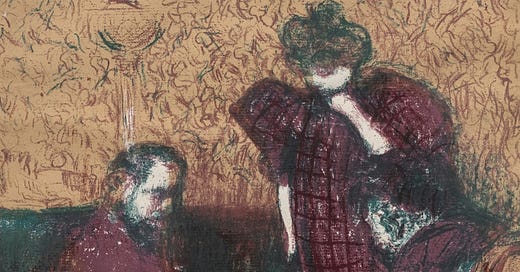A Man With Rose in Hand It is checkers, not chess, they play. Black-and-white paint conceal the splinters raiding the wooden board, poised to prick fingers as they push the pieces forward. No crown, no queenship, no knight- in-shining-silver -- circles alone compose the humble fields where all men die, where man may be a king. The scarlet of their gowns recount an opera of blood and grief while dissonant waves engulf their walls, the rage of war stopped by a man with rose in hand who falls so that his sons may be. And yet, they do not see his subtle submission. The boy sits with his shoulders hunched; the shade of death before him in the blackened lines of endless squares. His fingers tremble as he awaits the second when the pothole sinks into a coffin. One must die: these are the rules. No chair supports his father's aching back; he sits, his shoulders straight, his eyes are sad as he considers how to die, though he need not, and offer triumph to his son, who will not know until the day he offers triumph to his son. The daughter grips her neckline, hovering in the place of helpless intervention, like a mother left behind whose tears enfold the frozen toes of her frozen son. She knows. He sets the checker in the box, a love that takes another route to offer another life. One day the son will see the roses staining the ivory chair, the chair that bears his being.
Note from the Poet
In honour of Good Friday, I thought I would compose an ekphrasis poem that carries imagery from the passion. As I had begun to write this poem in February, it became more apparent to me how the game of checkers could function as a metaphor for the passion. While not a perfect metaphor, I saw the connection between the checker piece (a simple pawn different from chess in its absence of regality) and the humility of Christ in his choice to become a “man” in a metaphorical board of checkers. Like the father in the painting, who loses the game, Christ “though he need not” “die,” chooses “another route to offer another life.” This Good Friday, through this ekphrasis, I wanted to remember that it was not I that triumphed, not I that earned new life, the “ivory chair” — but it was the startling gift of a compassionate Father. May we understand this sacrifice in a renewed way this Easter as we, in sacrificial humility, “offer triumph” to the people that surround us.
He is Risen,
Abigail






Hey Abbi! Wow, how special it is to read one of your writings dedicated to Good Friday. There is so much hidden meaning in each line. I particularly like the phrase, “not I that earned new life, the “ivory chair” — but it was the startling gift of a compassionate Father” because it is a good reminder that Jesus is the one who did everything.
I’m so sorry I didn’t read this before Easter. I was in Minnesota experiencing my grandson‘s baptism at the age of 30 years. To me the poem brings out the sadness that the Father had to do this to redeem us all and that Christ never faltered so that we can have life anew. Blessings at this Eastertide.